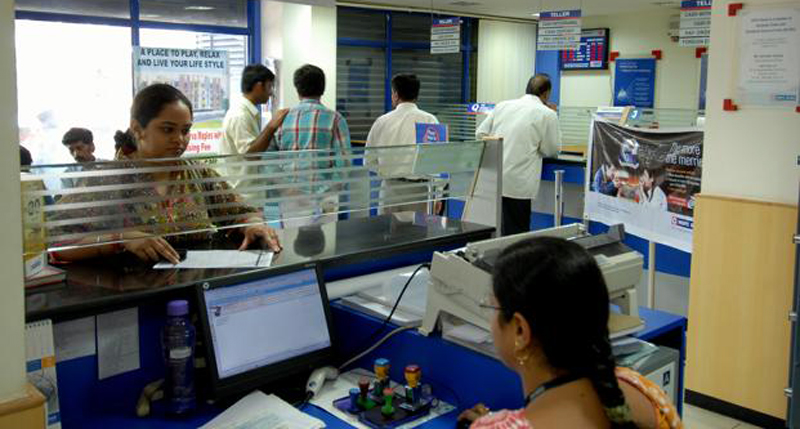SRINAGAR, Sept 22:
Chasing down the staffers, giving in to unusual demands and even paying the cost of defiance at times, bankers in the restive Kashmir valley have been going through a tumultuous time since the complete lockdown, while ensuring “skeletal” operations.
Officials hailing from outside the Valley were pulled out in the days leading to the Centre’s mega moves in Jammu & Kashmir on August 5. There were ominous signs of the lurking danger, but there was no information what was in the offing and the gigantic nature of the lockdown.
After an overnight lockdown of the entire State, the Centre abrogated Articles 370 and 35A which gave the State a distinct identity and special powers, and simultaneously decided to bifurcate J&K into two Union Territories.
“For the first three-four days after August 5, our operations were fully shut. Curfew was clamped across the Valley. In the past month, we had just skeletal operations in many parts, while some branches in sensitive areas remain shut,” a senior banker looking after the operations for a top lender visiting this town said.
The curse of modern banking is its reliance on communications, a luxury for the region’s 90 lakh residents, and also banks and bankers, who had to resort to crude and sometimes very ingenious ways of working around this impediment, he says.
In the days when some normalcy started to return, teams would spread out to addresses on record to chase their colleagues. Some were found immediately and others with some efforts as they have moved places.
Shops and commercial establishments have started opening very early in the morning every day, and the bankers followed suit in keeping the operations open during these hours, even though they fall outside the notified banking hours.
And banking in all these days involve mostly just one aspect of banking – cash withdrawals alone.
“In the skeletal operations that we manage to carry out, we have only one transaction taking place – cash withdrawals. New lending and also fresh deposits are fully shut,” a colleague of the senior banker cited above explains and adds that the leased BSNL lines are the lifeline for making such operations possible.
Sometimes, there have been unusual requests. Local Army commanders and also district officials livid at their staff not being able to transact, or some official work being stuck.
“They send vehicles looking for us at our residences. We go in convoys to open a branch, and after the required transactions and we are dropped back home” says a third banker, also based in Srinagar.
The State Government-run J&K Bank, the lead bank for the State, has the maximum over 700 branches, followed by SBI which has over 180. Thousands of officials are involved in rendering banking services to the people of the Valley.
Bankers have seen lockdowns in the past including a six-month one in 2016 after the gunning down of the local militant Burhan Wani, but insist this is different.
There are instances where stones have been pelted at branches while being opened, and there is also a case of a female banker’s two-wheeler was stolen allegedly by locals for daring to open the branch, recalls the banker.
After understanding the banking patterns, the officials feel keeping the ATMs running will be of help. The on-site ATMs located at branches is easier, but the off-site ones, generally outsourced to vendors, is pain point.
Being the casual staff, they should have moved from the registered addresses, making it tougher to get to them, especially in the absence of any communication facility. But the staff did manage to find a few, ATMs replenishments could begin.
However, it is as an anti-climax of sorts. “At the time of putting cash, the loader depends on an one-time password (OTP) which he receives through an SMS,” the banker rues, explaining inabilities to start the process.
Similarly, for want of communications, all the digital banking avenues are fully shut. There are no card swipe transactions at merchant establishments as the point-of-sale machines are also shut, no wallets like Paytm functions, nor can the unified payment interface services be accessed by customers, officials explained.
However, cash management was or is also a problem, with the currency chests becoming out of bounds.
“Many of the officer cadre or managerial staff is from outside the State. While leaving the Valley, they deposited the keys to the chests with the administrative personnel. It takes two keys together to open the vault and the people holding on to hundreds of keys find it difficult,” explains the Srinagar-based banker.
The high-ranking official, who hails from outside the state but continues to stay in Jammu, explains that the problems are faced only in the 10 districts of the Kashmir valley, which are under the lockdown, while other parts of State especially in Jammu and Ladakh regions, are almost normal.
The lender has also had to cancel recruitment drives as the exam is carried out online, or request candidates from the Valley to go to Jammu to take the exam, the banker says, adding local cable TV ‘news channels’ and a newspaper have been handy to pass out messages.
Another banker from the Valley, but now based in Leh, explains the personal side as well. There is complete normalcy as the Buddhist-majority Ladakhis are celebrating, and the banking operations are normal. But he has not been able to speak to his family back home and is not keen on taking the road journey down into the Valley across the Zojila Pass, which has now become an arduous one. (PTI)


